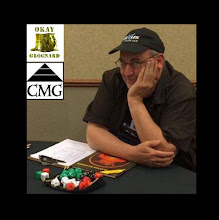A "Color Level Corrected History of the World Box Front"
is available on Board Game Geek here.
The game is mechanically rather simple but strategically complex. Game Play is described on a wiki page as:
The game is played in seven rounds known as epochs. In each epoch, each player plays a different empire; at the end of the epoch, the empires stop expansion and players score points. New empires then rise for the next epoch, although the remains of the previous empires stay on the board and score points for as long as they remain unconquered. The majority of points come from presence and/or dominance of various regions (generically called "areas") of the world, which fluctuate in worth throughout the game. For example, the area of Northern Europe is worth more in modern times than in ancient times, while the area of the Middle East is worth more in ancient times, based on historical importance. Other points come from capitols of empires, cities in general, monuments, and fleets or navigation. Inevitably, a limited selection of historical empires had to be chosen for inclusion in the game. In the newest version of the game, there are seven empires in each of the seven epochs.
Floyd, Keith, Wayne, and I got together in Wheeling, IL
In the several games I have played in the last year, I have found that a new approach needs to be taken in each epoch, almost completely based on which empire for that epoch becomes your own. Due to the drafting element in empire acquisition, there is a mechanism in place for players to keep whoever is in the lead in check if they work together well.
But a front-runner can sometimes use the inclination to quell him to his advantage by capitalizing on the success of a previous epoch with quick scoring if opponents leave that door open to him. I've had this opening in two games I have played and managed to turn my purposeful over-extension of forces in both cases into a double payoff in victory points in successive epochs. Managing just one or two other decent victory point levels in less successful epochs can make the running point total very difficult to overcome, provided some good choke points are established and the damage dealt to opponents is spread around judiciously, more or less evenly.
Playing events at the right time is crucial. With three Greater Event Cards and seven Lesser Event Cards in the arsenal of each player, and the ability to play any two each epoch, there are four out of fourteen opportunities that need to go wanting. You really have to trust your gut on whether to hang on to a particular leader card until later or jump on the chance to take an advantage in battle early. Playing a Minor Empire card in a turn where you feel you'll get to score twice in a quick turnaround can really pile on the VPs. Playing a different Minor Empire at a time when you think it will be allowed to remain for a few epochs, while achieving little else that epoch, is sometimes the subtle but best play.
Slipping a few troops into areas that aren't valuable early in the game is a worthwhile notion. On more than one occasion, I have had some troops from the first turn wind up helping me gain Dominance or even Control of a late-blooming area, thus getting the lion's share of points on a late scoring round even when given weak empire cards. As with any game that has dice, there is some degree of luck involved. But, as the saying goes, Fortune Favors the Bold, so expand, expand, expand, knowing full well that the empires will rise and fall and grabbing the victory points that can be had in the moment often sets up a potential victory with even average dice rolling.
Wargaming Wednesday on MFWARS.com
A closer examination of board and miniatures Wargaming.
Please Like, Share, Plus, Tweet, Follow, and Comment!





No comments:
Post a Comment